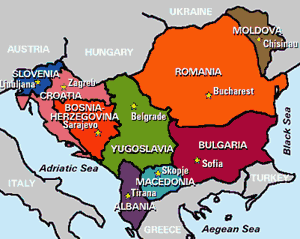 |
| Western BALKAN |
GOING THROUGH THE BIGGEST CRISIS OF ITS ABOUT 60-YEAR
HISTORY, THE EU HAS BEEN THE RECIPIENT OF A NOBEL PRIZE
By
Erhan Türbedar
The
Nobel committee cites the reconciliation of GERMANY and FRANCE, the restoration
of stability to the democracies in southern EUROPE, the integration of Eastern EUROPE
with the Union and the enlargement perspective covering the western BALKAN
countries and TURKEY as the reason for the EU having been deemed worthy of the
2012 Nobel peace prize. It also says the EU has made important contributions in
the EUROPEAN continent regarding conciliation, democracy and human rights.
Should it be a budding hope for the western BALKAN countries to join the EU
with the importance attached to its enlargement perspective having been a
leading factor to get the Nobel prize?
INDIFFERENCE BY THE EUROPEAN UNION TOWARDS BALKAN COUNTRIES
The
EUROPEAN UNION has played undeniably important roles in the transformations of
the BALKANS. Brussels has first coped with crisis management in the region and
has later included all BALKAN countries in the EU enlargement process. It has
made it clear on various occasions that the door to full membership is open for
the BALKAN countries. However, the BALKAN countries are well aware of the fact
that their memberships are contingent not only on the reform movements they are
to carry out but also on the developments within the Union. The BALKAN countries
have recently been querulous about the Union’s lack of attention. This leads to
the calling into question of EU’s enlargement process and the sustainability of
the reforms in the Western BALKANS. There are even those who believe CROATIA’S membership,
seemingly due in the middle of 2013, may also be delayed.
Despite
increased pessimism in the western BALKANS, it is obvious the Union’s eastward
enlargement is underway. CROATIA’S EU membership has been guaranteed.
Membership negotiations were started with MONTENEGRO in the middle of 2012. The
EUROPEAN Commission has also been offering MACEDONIA to start membership talks
for the fourth straight year but Skopje cannot make any progress in that regard
because of the name dispute it has with GREECE. Owing to the headway it has
made in the past two years in its reforms programme, ALBANIA also seems to be
edging towards getting the candidacy status. On the other hand, despite the
recognition of KOSOVO by five EU members, the query continues through legal
channels for the Stability and Accession Agreement to be signed with KOSOVO.
BALKAN PEOPLE FEEL THAT THE EU NO LONGER EMANATES
CONFIDENCE
 |
| Entire BALKAN |
Considering
all that, qualifying the EU’s enlargement process as critical and fragile is
not realistic. It is more appropriate to say that the crisis the EU is in the
grips of at the moment is also making itself felt in the enlargement process.
The
latest statistics by Eurostat indicates that the rate of joblessness in the Euro
Zone has reached a record level of 11.7%. Almost 60% of those under 25 in
crisis-ridden GREECE and SPAIN are unemployed. The difficulties which have
shattered many of EUROPE’S economies have not only yanked further enlargement
from among the basic priorities of Brussels but have also tarnished its image
among the BALKAN peoples. The BALKAN peoples are of the view that the EU no
longer emanates confidence and no one is certain about what shape it is going
to be in after a couple of years.
As
a matter of fact, the western BALKAN states should focus on the economic
measures they need to take and their growth instead of calling into question
whether the enlargement process is going to be continued. Tackling high public
debt and budget deficit as well as the chronic problem of unemployment, the
western BALKAN countries have not been able to register any significant growth
for the past three years.
Actually,
it is primarily the economic problems which put the biggest pressure on
regional governments. The citizens of the western BALKAN countries condemned
for years on end to live under conditions far from prosperous with the
motivation of politically tinged nationalistic discourse now seem prepared to
sever their support for every financially unsuccessful government. And it is at
this point that the impact on the western BALKAN countries of the EU crisis may
assume more serious dimensions. Save for EU funds, trade and financial relations
between the EU and the western BALKAN countries may bump into hardships. What
is more, the BALKAN countries are unlikely to have more investors from the EU
countries in the next couple of years. There is no doubt EU enlargement will
continue in the future as well, but the western BALKAN countries should
concentrate on their own development problems more seriously rather than
fancying the idea that their problems will melt away with a magic stick.


No comments:
Post a Comment